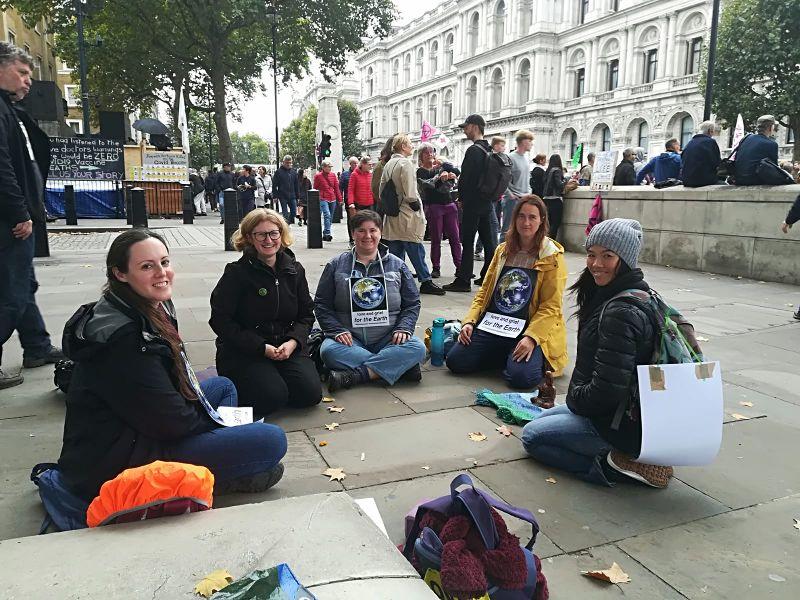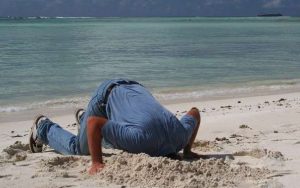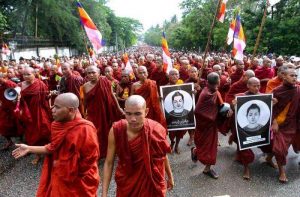Last weekend I joined an Extinction Rebellion action in London for the first time since April. A few thousand of us gathered in Trafalgar Square for some speeches before marching to Downing Street, where the British prime minister was due to give a press conference later that afternoon. We sat down on the roads while a samba band played. XR Buddhists meditated in amid all the noise, and later we sat in a circle and chanted mantras to Guanyin and to Amitabha. There were very few police present and no arrests took place—they have, perhaps, wised up to the fact that we’ll all go home in the evening anyway, and it’s a waste of police resources to put some of us in cells.
This protest didn’t make the news, especially as we were “upstaged” by some fellow eco-activists from Just Stop Oil, who threw tomato soup at Van Gogh’s Sunflowers painting in the National Gallery. They knew that the painting wouldn’t be harmed—it’s behind protective glass—but the action broke a taboo. Soon the two young women who threw the soup were being horribly abused on social media by what seemed like most of the UK. I just checked Twitter and the video of their action has had 48.9 million views.
In the days after I returned home, I was surprised at how much emotion had been stirred up in me. In retrospect, this was a direct result of being around a group of people who are as scared about the climate crisis as I am. As I caught up with friends and colleagues, there were at least two who’d had a spell in prison since I’d seen them last. It was touching to read all the placards and to see the small children brought along by their parents. It was reassuring to know that I wasn’t alone. It was also frustrating and confusing to see how relatively few of us there were and to guess at how little effect we were having on the world that day.
Being around this “tribe” also connected me back into my climate grief. In my first year of activism, I was accompanied by this grief most of the time—this deep acknowledgement of the harm we’ve already caused and of the harm that is coming. As time has gone on, it has receded into the background—perhaps because I’ve processed some of it, but more likely because I’ve turned my attention to the tasks of everyday living: paying the mortgage, running the temple, keeping an eye on aging parents. As I hung out with these people who’d made room in their lives to attend protests, I frequently found myself on the edge of tears.
The third strand of my heightened emotions was the way I felt about the public response to the soup action. I was particularly shocked by a Buddhist colleague, who had posted the video of the activists throwing soup. He said that he wasn’t going to unmute them and listen to what those “numpties” were saying, and that he looked forward to them receiving long jail sentences. Where does this disdain come from? Many people said that it “hadn’t won them over” or that it had “damaged the cause” and I wonder what this meant. Was it that they were previously in support of saving our ecosystem, but after watching the soup being thrown they’d rather the planet became uninhabitable?
I read all these angry comments and then I watched the video again. The young women look defiant as they throw the soup and make their speech. But was that a wobble in her voice? I know from doing similar actions that they were most likely terrified. What fears drove them to take this action, risking jail at their young age? How were they feeling now as the recipients of so much hate? I felt so protective of them. I thought back to my “rebellion of one” action, when I sat in a road on my own with a placard and a secret support team, and how I felt when drivers screamed abuse. I remembered late nights of scrolling through news items during rebellions, desperate for the commentators who drew attention to the reasons behind our non-violent direct action. My heart breaks for these young women, who are facing many more years in a dystopian future than I am. My heart breaks.
Where does all this leave me? It leaves me in a place of not-knowing. I don’t know whether the soup action will have a net effect of “good” in the world. Will it, and all of Just Stop Oil’s other actions, help to shift the debate about new gas and oil? We’ll have to wait a few decades to see. Did it make any difference that a few thousand of us gathered outside Downing Street on Friday? Who knows. Should I be doing more activism, or less, or a different kind? I have no idea. How can we raise awareness of the deadly iceberg our ship is steaming toward? How can we do it in a way that helps to unite people, rather than polarizing them further? I don’t know. I’m lucky that my Buddhist practice helps me to be as comfortable as I can in these not-knowing places. I will continue to be curious and patient, and to wait for answers to unfold.
I do know that I am glad that I went to London, and that I will go again for the rebellion on 21 April next year (join me?). Engaging in protest, even occasional, even mild, helps me to stay sane. I do know that I will continue to write these articles, and post “Dear Earth” letters on Facebook, and speak to our sangha about activism and about the planet. I know, of course, that I am just one flawed person with very little power on a planet of 7.75 billion. Sometimes that leads me to despair. I also know that the Buddha has my back and is always present. I know that the Buddha’s love is bigger than all the past, present and future suffering in the world. I can rely on that, and I do.
Read more
Why art? Why now? A Q&A on yesterday’s National Gallery action (Google document)
Related features from BDG
Buddhist Voices in the Climate Crisis: Earth Words and Watershed Activism
Buddhist Voices in the Climate Crisis: Welcome to the Anthropocene
Green Shoots of Hope, Part Two – Youth Climate Leaders in the Americas
Green Shoots of Hope – Youth Climate Leaders in Asia and Africa
Buddhistdoor View: Overcoming Our Denial of Responsibility for Climate Change
Related news reports from BDG
Climate Change: Ancient Buddhist Statues Emerge from China’s Drought-Stricken Yangtze River
Buddhists Discuss Self-Immolation and Protest after Climate Activist’s Death
Engaged Buddhism: INEB to Join PeaceCon@10 Forum on COVID, Climate, and Conflict
Dalai Lama Shares a Call to Action as COP26 Climate Summit Opens
Buddhists Join Pope and Other Religious Leaders in Call For Greater Action on Climate Change














What does any of this left-wing propaganda have to do with Buddhism???